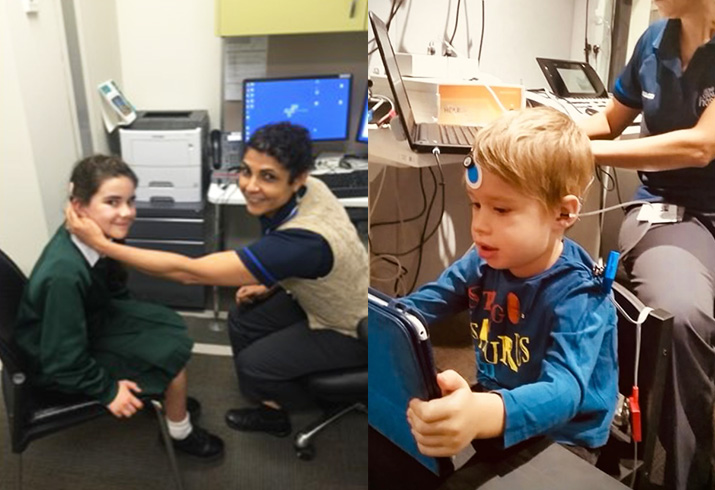How growing up with a cochlear implant changed the lives of paediatric patients with SSD
 Left: Young Emma with Dayse. Right: Lucas as a toddler with Dayse.
Left: Young Emma with Dayse. Right: Lucas as a toddler with Dayse.
Most people would have some understanding of what a world of no sound would be like – complete silence.
What's less understood, is what it would be like to experience single-sided deafness (SSD).
For Emma Pickering, her left ear is completely fine. It was a hearing test in Kindy where the surprising discovery was made that she was deaf in her right ear.
"I could hear perfectly well in my left ear but a nerve in my right ear was too thin which impacted my ability to hear out of that ear," Emma said.
"My parents made the decision to take part in a trial for SSD with the research investigating how a cochlear implant could help restore hearing on the impacted side."
"I was just five when I had the surgery to implant the cochlear device at Fremantle Hospital.
"Given my young age, it was sometimes difficult. Kids can be cruel so I used to try and hide it under my hair so no one could see it."
Now 13 years on from the life changing surgery, Emma is studying professional writing at Curtin University.
"Looking back, it was the best thing to happen in my life."
"I'm no longer ashamed of my implant – it has become part of my identity – it's not something I would try and hide now."
Emma was the very first child with SSD to receive a cochlear implant while Lucas Gallop was the very first baby with SSD to receive a cochlear implant in Australia.
After receiving what felt like a devastating diagnosis of profound SSD when Lucas was just five weeks old and being thrown into a world of unknown, Lucas' Mum Jenn Gallop, began her own research and stumbled across Dayse and her Audiology team.
"The research was really just in its infancy then, and while the team had used the cochlear implant on only a handful of adults with SSD, they hadn't done the surgery with any children," Jenn said.
"However, we were moved to see the difference it had made to one particular adult patient so we decided to go ahead and anxiously waited to see what the results would be for our 16-month-old who underwent a six-hour surgery to implant his cochlear device.
"There have been a lot of ups and downs on our hearing journey but Lucas understands the benefits of wearing the cochlear implant now – it's made a huge difference to his confidence whether it's listening in class at school, chatting with his friends and more recently learning how to play classical guitar."
Both Emma and Lucas were under the care of Fiona Stanley Hospital (FSH) Head of Audiology, Dayse Távora-Vieira.
It's Dayse's work as a researcher that resulted in internationally accepted practice changes in audiology benefiting patients worldwide.
Her research output placed FSH on the world stage in the field of SSD rehabilitation and resulted in changing policy nationally and internationally.
"Over 10 years ago, the revolutionary use of cochlear implants to restore hearing in individuals with SSD began, marking a significant milestone in auditory rehabilitation," Dayse said.
"We were the first group in Australia to embark on this type of research which investigated the use of a cochlear implant in rehabilitating SSD and it was thanks to our work that the cochlear implant for SSD received TGA approval in 2015.
"Our hospital has been at the forefront of this pioneering effort, leading the way in the implantation of adults and children with SSD - a journey still under active research investigation.
"Through continuous follow-up and rehabilitation support from their families and dedicated professionals, both Emma and Lucas have achieved significant milestones, and their progress provides valuable insights for ongoing research and future advancements in treating SSD.
"For Emma and her family, they have demonstrated remarkable resilience and commitment to her rehabilitation journey which has profoundly transformed her life, enhancing her hearing abilities and overall quality of life."
"As for Lucas and his family, they hold a very special place in the hearts of the Audiology team at FSH.
"We shared moments filled with tears - tears of anxiety, fear, and excitement - as we celebrated each milestone and every sign of progress that Lucas achieved.
"Lucas' journey is a testament to the bravery and dedication of his family, and the transformative power of research and evidence-based care. His story continues to inspire us.
"Our hospital continues to lead in research and clinical practices, ensuring that individuals with hearing impairments receive the best possible care and the opportunity to experience the world of sound."
Meanwhile for teenagers Emma and Lucas - life simply carries on – with all the wonderful sounds to accompany it.
Keep up to date with our news and achievements
Find out more on Facebook (external site) or LinkedIn (external site)

